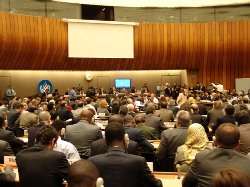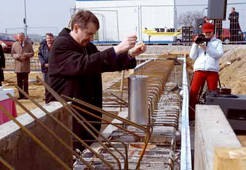The U.N. Commission on Human Rights (UNCHR) has ended more than 60 years of work. During a concluding session, U.N., governmental, and non-governmental representatives looked forward to the Commission's replacement body, the U.N. Council on Human Rights. The new Council is intended to have greater accountability and transparency, and will meet more frequently.
The Peruvian chairman of the UNCHR called the 62nd and last session of the Commission to order. The U.N. High Commissioner for Human Rights, Louise Arbour, acknowledged the many achievements of the Commission, while accepting that they had not been perfect. "History was made on the 15th of March. For, without question, the creation of the Human Rights Council was a moment of historical importance," she said.
High Commissioner Arbour said a strong global human-rights body, operating in a frank and cooperative environment is needed to protect the rights of all people. "There are millions of people all over the world, right now, who are looking to the United Nations for protection and redress against the violation of their rights, and deprivation of their freedoms. It is to them, and to future generations, that the work of the Human Rights Council must be dedicated," noted Arbour.Arbour's eulogy was followed by representatives of governments and human-rights groups that agreed the Commission's historical legacy was mixed. While criticizing some of its actions, they praised the Commission for being one of the few forums in which the often silenced voices of the abused could be heard.
The discredited, outgoing Commission has been criticized for admitting known human-rights violators, such as Sudan and Cuba, into its membership ranks.
Other speakers also pointed to the problem of politics and double standards that have plagued the Commission, which, in the words of UN Secretary-General Kofi Annan, has been "undermined by the politicization of its sessions" and its "declining credibility has cast a shadow on the reputation of the United Nations system as a whole."

Attending this closing session was Seventh-day Adventist Church representative Dr. Jonathan Gallagher, who regretted the purely procedural nature of the last meeting.
"It is regrettable that the Commission gave no attention to human rights issues at all in its 62nd session," he observed. "All the delays and postponements caused by the backroom negotiations meant that no one had the opportunity to make any presentations on substantive issues. We came prepared to speak out on several issues, especially religious freedom violations, and were denied any chance to speak. We agree with the Ambassador of Brazil who spoke of his deep dissatisfaction over a session stripped of all substance, with no opportunity to deal with issues of concern. Similarly we echo the words of the Ambassador of the Netherlands who called for the role of non-government organizations to continue to be emphasized."
It is planned that the new Human Rights Council will take over all the work and mechanisms of the former Commission, and is expected to begin its work on June 19. [Editors: Jonathan Gallagher and Christian B. Schaeffler for APD]


